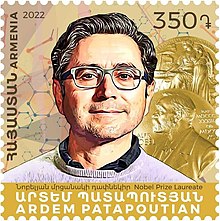Ardem Patapoutian | |
|---|---|
 Ardem Patapoutian in 2022 | |
| Born | 1967 (age 56–57) Beirut, Lebanon |
| Citizenship |
|
| Education | American University of Beirut University of California, Los Angeles (BS) California Institute of Technology (MS, PhD) |
| Known for | research of PIEZO1, PIEZO2, TRPM8 receptors |
| Awards | Nobel Prize in Physiology or Medicine (2021) |
| Scientific career | |
| Fields | Molecular biology, neuroscience |
| Institutions | Scripps Research |
| Thesis | The role of the MyoD family genes during mouse development (1996) |
| Doctoral advisor | Barbara Wold |
Ardem Patapoutian (born 1967)[1] is a Lebanese-American molecular biologist, neuroscientist, and Nobel Prize laureate of Armenian descent.[2] He is known for his work in characterizing the PIEZO1, PIEZO2, and TRPM8 receptors that detect pressure, menthol, and temperature. Patapoutian is a neuroscience professor and Howard Hughes Medical Institute investigator at Scripps Research in La Jolla, California. In 2021, he won the Nobel Prize in Physiology or Medicine jointly with David Julius.[3]
Ardem Patapoutian (Armenian: Արտեմ Փաթափութեան) was born to an Armenian family in Beirut, Lebanon.[2][4][5] His father, Sarkis Patapoutian (better known by the pen name Sarkis Vahakn), is a poet and an accountant,[6] while his mother, Haiguhi Adjemian, was the principal of an Armenian school in Beirut. He has a brother, Ara, and a sister, Houry.[7] His ancestors survived the Armenian Genocide.[8][9] He is childhood friends with journalist and author Vicken Cheterian.[10] He attended the Demirdjian and Hovagimian Armenian schools in Beirut.[10] He enrolled at the American University of Beirut for a year before emigrating to the United States in 1986.[5][11] He received a B.S. degree in cell and developmental biology from the University of California, Los Angeles in 1990 and a Ph.D. degree in biology from the California Institute of Technology in 1996 under direction of Barbara Wold.[12][5][13]
As a postdoctoral fellow, Patapoutian worked with Louis F. Reichardt at the University of California, San Francisco.[14] In 2000, he became an assistant professor at the Scripps Research Institute.[15] Between 2000 and 2014, he had an additional research position for the Novartis Research Foundation.[16] Since 2014, Patapoutian has been an investigator for the Howard Hughes Medical Institute (HHMI).[13]
Patapoutian, a naturalized US citizen,[5] lives in Del Mar, California with his wife Nancy Hong, a venture capitalist, and son, Luca.[17][18][19][20]
Patapoutian's research is into the biological receptors for temperature and touch (nociception).[3] The knowledge is used to develop treatments for a range of diseases, including chronic pain.[21] The discoveries made it possible to understand how heat, cold and mechanical forces trigger nerve impulses.[21]
Patapoutian researches the signal transduction of sensors. Patapoutian and co-workers inactivated genes.[22] In this way, they identified the gene, that made the cells insensitive for touch.[22] The channel for the sense of touch was called PIEZO1 (transl. pressure).[22] Through its similarity to PIEZO1, a second gene was discovered and named PIEZO2.[23] This ion channel, the more important of the two mechanoreceptors, is essential for the sense of touch.[23][24] PIEZO1 and PIEZO2 channels have been shown to regulate additional important physiological processes including blood pressure, respiration and urinary bladder control.[23]
Patapoutian also made significant contributions to the identification of novel ion channels and receptors that are activated by temperature, mechanical forces or increased cell volume.[25][26] Patapoutian and co-workers were able to show that these ion channels play an outstanding role in the sensation of temperature, in the sensation of touch, in proprioception,[27] in the sensation of pain and in the regulation of vascular tone. More recent work uses functional genomics techniques to identify and characterize mechanosensitive ion channels (mechanotransduction).[15][28][29][30]


Patapoutian has an h-index of 68 according to Google Scholar,[31] and of 63 according to Scopus[32] (As of May 2020[update]). He has been a Fellow of the American Association for the Advancement of Science since 2016, a member of the National Academy of Sciences since 2017[33] and of the American Academy of Arts and Sciences since 2020.[34]
In 2017, Patapoutian received the W. Alden Spencer Award,[35] in 2019 the Rosenstiel Award,[36] in 2020 the Kavli Prize for Neuroscience,[37] and the BBVA Foundation Frontiers of Knowledge Award in Biology / Biomedicine.[38]
In 2021, he was awarded the Nobel Prize in Physiology or Medicine jointly with David Julius for their discoveries of receptors for temperature and touch.[3][39][40]
In October 2021 President of Lebanon Michel Aoun awarded Patapoutian the Lebanese Order of Merit.[41]
In December 2021, Patapoutian received the American Academy of Achievement’s Golden Plate Award presented by Awards Council member Frances Arnold.[42]
In 2022, Patapoutian was named by Carnegie Corporation of New York as an honoree of the Great Immigrants Award.[43]
Patapoutian, the first Armenian Nobel laureate, received a hero's welcome when he visited Armenia in June 2022. Prime Minister Nikol Pashinyan awarded him the Order of St. Mesrop Mashtots,[44] while the Armenian National Academy of Sciences elected him an honorary member,[45] and the Yerevan State Medical University awarded him an honorary doctorate.[46] Patapoutian gifted a replica of his Nobel medal to the History Museum of Armenia.[47][48] HayPost issued a stamp dedicated to him.[49]